If you are a guinea pig owner, then you know how important it is to ensure your pet has a healthy and balanced diet. Guinea pigs are herbivores, and their primary diet should consist of fresh hay, pellets, and vegetables. Speaking of which, have you ever wondered if guinea pigs can eat sweet mini peppers?
Sweet mini peppers are colorful and delicious, but are they safe and healthy for guinea pigs? In this article, we’ll explore the nutritional value of sweet mini peppers, their potential benefits and risks, and how to introduce them to your guinea pig’s diet safely. So, read on to find out if your furry friend can safely enjoy this sweet vegetable!
Key Takeaways
- Guinea pigs are herbivores and require a healthy, balanced diet.
- Sweet mini peppers are attractive and tasty for guinea pigs.
- It’s essential to understand the nutritional value of vegetables before introducing them to your guinea pig’s diet.
- Always introduce new foods gradually, and monitor how your pet responds.
- Consult with your veterinarian before making any significant changes to your pet’s diet.
Nutritional Value of Sweet Mini Peppers
Sweet mini peppers are not only visually appealing but also pack a nutritional punch for guinea pigs. This colorful vegetable is an excellent source of vitamin C, which is vital for guinea pigs, as they cannot produce their own. Along with vitamin C, sweet mini peppers also provide essential vitamins A and K, which contribute to maintaining a healthy immune system and blood clotting, respectively.
In terms of minerals, sweet mini peppers contain potassium, which aids in regulating blood pressure, and calcium and phosphorus, which are essential for maintaining strong bones. Moreover, this vegetable is low in fat and calories, making it an excellent option for overweight or obese guinea pigs.
The Importance of a Balanced Diet for Guinea Pigs
Just like humans, guinea pigs require a balanced diet to maintain optimal health. A diet rich in essential vitamins, minerals, and nutrients is crucial to ensure their overall well-being and prevent health issues from arising.
Their diet should include a variety of fruits, vegetables, hay, and pellets. Providing a balanced combination of these will help to meet their nutritional needs and keep them healthy.
Hay is a crucial part of a guinea pig’s diet as it provides fiber necessary for proper digestion and to support their dental health. Pellets, on the other hand, are a concentrated source of vitamins and minerals that should be fed in moderation.
Introduce vegetables and fruits gradually, one by one, in small portions, and remove any uneaten food after about an hour to avoid spoiling. Fruits and vegetables should make up about 15-20% of their diet, with vegetables being the more significant portion.
It’s essential to remember that while some foods may be safe for humans, they may not be suitable for guinea pigs. Always check with a veterinarian before introducing new foods to your guinea pig’s diet.
Guinea Pigs and Vegetables: The Basics
Guinea pigs are herbivores and require a diet rich in vegetables. Vegetables provide essential nutrients vital for their health, although not all vegetables are safe for them to consume. It’s important to introduce new foods gradually to avoid digestive upsets and observe their reaction to new foods.
Safe vegetables for guinea pigs include:
- Carrots
- Bell peppers
- Zucchini
- Cucumber
- Romaine lettuce
While leafy greens like spinach and kale are also safe, they should be fed in moderation due to their high calcium content, which can cause health issues if consumed in excess.
It’s recommended that guinea pigs have access to fresh vegetables daily. The amount of vegetables a guinea pig should consume depends on their age, weight, and overall health. A general guideline is to provide 1 cup of fresh vegetables per pig per day.
Remember: Always consult with a veterinarian before making significant changes to your pet’s diet.
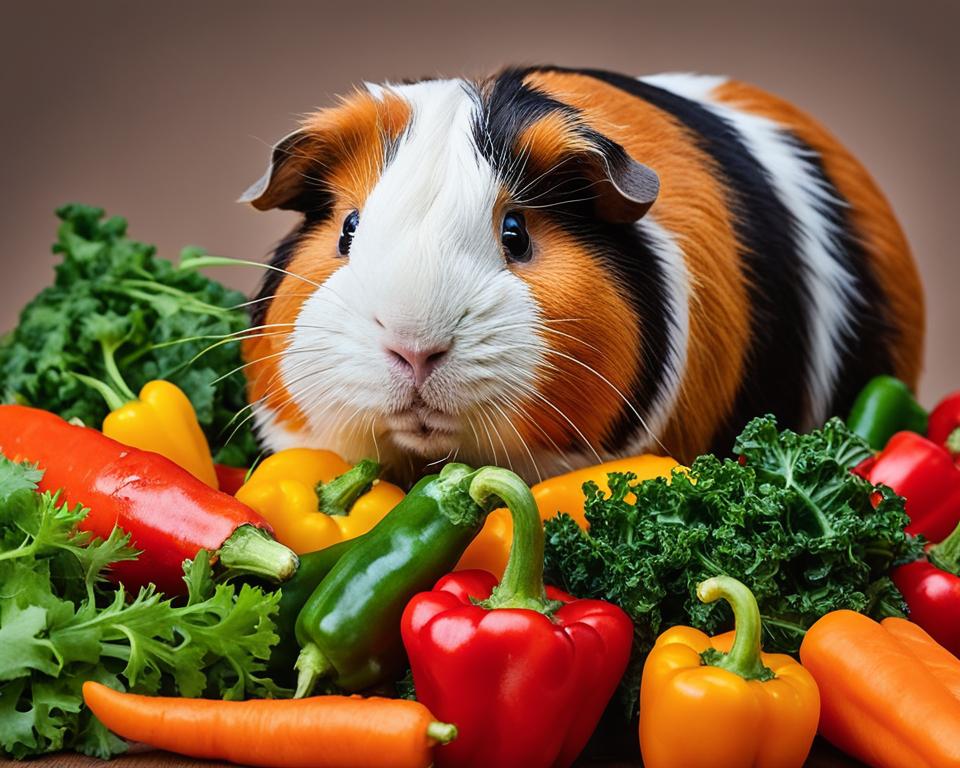
Are Sweet Mini Peppers Safe for Guinea Pigs?
Many pet owners wonder if sweet mini peppers are a safe addition to their guinea pig’s diet. While sweet mini peppers are a colorful and tasty vegetable, you must consider your pet’s specific dietary needs before introducing any new food.
Safety is the top concern when adding any new element to your pet’s diet. Only serve the safe food to avoid harm to your beloved pet.
Potential Health Benefits
Sweet mini peppers are rich in vitamins and minerals that are beneficial for guinea pigs. They contain high levels of vitamin C, an essential nutrient that guinea pigs require in their diet. Additionally, they are a good source of vitamin A, which supports healthy vision.
Risks Associated with Sweet Mini Peppers
While sweet mini peppers can be a healthy addition to your guinea pig’s diet, there are some risks to consider. It’s important to control portions, as overfeeding sweet mini peppers can lead to digestive issues. Additionally, sweet mini peppers have high sugar content, so they should be served in moderation to avoid obesity and other health issues.
Introducing Sweet Mini Peppers to Your Guinea Pig’s Diet
After determining that sweet mini peppers are safe for guinea pigs to consume, it’s important to introduce them gradually to your pet’s diet. Guinea pigs have sensitive digestive systems, and a sudden change in diet can cause digestive upset. Follow these steps for a smooth transition:
- Prepare the peppers: Wash the sweet mini peppers thoroughly and cut them into small, bite-sized pieces.
- Monitor your pet’s reaction: Offer a small piece of pepper as a treat to gauge your guinea pig’s reaction. If they eat it without any issues, gradually increase the portion size over the course of a few days.
- Incorporate peppers into their regular diet: Once your guinea pig is accustomed to the new addition, incorporate sweet mini peppers into their regular meals. Keep in mind that this vegetable should not make up a significant portion of their diet, but rather be offered as a supplement to ensure variety.
Remember to always provide clean water and hay for your guinea pig, as well as a balanced diet that includes vegetables, fruits, and pellets. Any sudden changes in diet should be done gradually and under the supervision of a veterinarian.
Serving Sizes and Frequency of Sweet Mini Peppers
While sweet mini peppers can be a healthy addition to your guinea pig’s diet, it’s essential to maintain proper portion control and frequency to prevent digestive issues. The recommended serving size is one small pepper per day, sliced into small pieces and offered alongside other vegetables.
It’s important to note that introducing new foods gradually is crucial to ensure your guinea pig’s digestive system adjusts to the changes. Begin by adding a small piece of sweet mini pepper to their regular diet and gradually increase the amount over several days until they reach the recommended serving size.
As with any new food, monitor your guinea pig’s reaction to sweet mini peppers closely. If you notice any signs of discomfort, such as diarrhea or bloating, reduce the serving size or frequency.
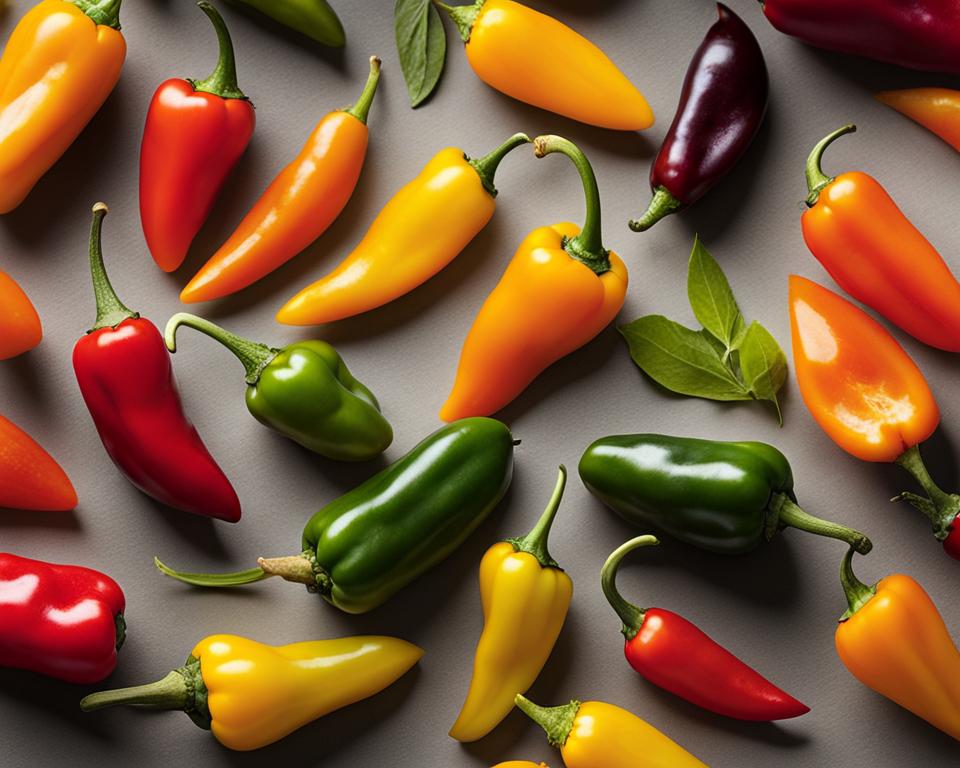
Portion Control
While sweet mini peppers are nutritious, it’s crucial to practice moderation when feeding them to your guinea pig. Offering too much at once can cause digestive issues or potentially lead to obesity.
Make sure to include sweet mini peppers as part of a balanced diet, alongside other vegetables, hay, and high-quality pellets.
Frequency
Offer sweet mini peppers to your guinea pig only once per day. While it’s tempting to offer this tasty treat more often, doing so may lead to digestive problems or other health issues.
Benefits of Sweet Mini Peppers for Guinea Pigs
Sweet mini peppers are not only tasty but also offer several benefits to guinea pigs. These colorful veggies are packed with essential vitamins and minerals that can support your furry friend’s overall health and well-being.
Rich in Vitamins C and A
Sweet mini peppers are an excellent source of vitamin C, which is essential for maintaining a robust immune system. Guinea pigs cannot synthesize vitamin C and must obtain it from their diet. Additionally, sweet mini peppers contain vitamin A, which supports healthy skin and eyes.
Low in Calories
Sweet mini peppers are low in calories, making them a perfect addition to your guinea pig’s diet. They can be an excellent alternative to treats that are high in sugar or fat.
Help with Digestion
As guinea pigs have a delicate digestive system, sweet mini peppers with their high fiber content can help keep their gut healthy and prevent digestive problems.
Introducing sweet mini peppers to your guinea pig’s diet gradually is key. Monitor your pet’s reaction to ensure they tolerate them well. When fed in moderation, sweet mini peppers can be a nutritious and delicious addition to your furry friend’s daily diet.
Possible Risks and Precautions
While sweet mini peppers can offer various health benefits to guinea pigs, there are also potential risks associated with feeding them to your furry friend. One of the main concerns is the high sugar content of sweet mini peppers, which can lead to obesity, dental problems, and digestive issues if consumed in excess.
Additionally, some guinea pigs may be more sensitive to the natural compounds found in peppers, which can cause gastric upset and discomfort. It’s essential to introduce these vegetables gradually and monitor your pet’s reaction.
To minimize the risks associated with feeding sweet mini peppers to your guinea pig, you should always wash them thoroughly and remove the stems and seeds. It’s also recommended to serve them in moderation and as part of a balanced diet. Speak to your veterinarian if you have any concerns or questions about your pet’s diet.
The Importance of Variety in Your Guinea Pig’s Diet
While sweet mini peppers can be a nutritious addition to your guinea pig’s diet, it’s essential to offer a range of vegetables to ensure they receive all the essential nutrients they need. Experiment with other safe vegetables, such as bell peppers, cucumbers, and carrots, to provide variety and promote optimal health.
Alternatives to Sweet Mini Peppers
If you’re looking for an alternative to sweet mini peppers, there are plenty of vegetables that can be safely incorporated into your guinea pig’s diet. Here are a few options:
- Kale: This leafy green is packed with vitamins A and C, making it an excellent addition to any guinea pig’s diet.
- Zucchini: A great source of fiber and vitamin C, zucchini is a crunchy and refreshing vegetable that most guinea pigs enjoy.
- Carrots: These crunchy root vegetables are high in beta-carotene, which is essential for maintaining healthy vision and skin.
Remember, as with any new food, it’s important to introduce it gradually and monitor your guinea pig’s reaction to ensure they tolerate it well.
Conclusion
In conclusion, while sweet mini peppers can be a tasty and nutritious addition to your guinea pig’s diet, it’s crucial to approach new foods with caution. A balanced diet that includes a variety of vegetables is essential for their health and well-being. Before introducing sweet mini peppers or any new food, consult with a veterinarian to ensure that it’s safe and appropriate for your pet.
Remember to start with small portions and gradually increase the serving sizes. Keep a close eye on your guinea pig’s reaction to the new food, and if any adverse effects occur, discontinue the use immediately. Overall, sweet mini peppers can provide a range of benefits for your furry friend, but it’s important to always prioritize their safety and health above all else.
FAQ
Can guinea pigs eat sweet mini peppers?
Yes, guinea pigs can eat sweet mini peppers. However, it’s important to introduce them gradually and in moderation.
What is the nutritional value of sweet mini peppers?
Sweet mini peppers are low in calories and high in vitamin C, vitamin A, and antioxidants, making them a healthy addition to a guinea pig’s diet.
Why is a balanced diet important for guinea pigs?
A balanced diet is crucial for guinea pigs as it provides them with the necessary nutrients to support their overall health, growth, and wellbeing.
Which vegetables are generally safe for guinea pigs to eat?
Guinea pigs can eat a variety of vegetables such as lettuce, spinach, carrots, and bell peppers. It’s important to introduce new foods gradually and in appropriate portion sizes.
Are sweet mini peppers safe for guinea pigs?
Yes, sweet mini peppers are safe for guinea pigs to consume. However, it’s always important to wash them thoroughly and remove any seeds or stems before feeding them to your pet.
How should I introduce sweet mini peppers to my guinea pig’s diet?
To introduce sweet mini peppers, start by offering a small piece and monitor your guinea pig’s reaction. If there are no adverse effects, gradually increase the portion size over time.
What are the recommended serving sizes and frequency of sweet mini peppers?
It is recommended to serve a small piece of sweet mini pepper once or twice a week to avoid overfeeding and digestive issues.
What are the benefits of sweet mini peppers for guinea pigs?
Sweet mini peppers provide guinea pigs with essential vitamins and antioxidants, which can help support their immune system and overall health.
What are the possible risks and precautions of feeding sweet mini peppers to guinea pigs?
While sweet mini peppers are generally safe, some guinea pigs may experience digestive upset or allergies. It’s important to monitor your pet and consult with a veterinarian if any adverse effects occur.
Are there alternatives to sweet mini peppers for guinea pigs?
Yes, if you prefer not to feed sweet mini peppers to your guinea pig, you can consider offering other vegetables like cucumber, zucchini, or celery as alternative options.

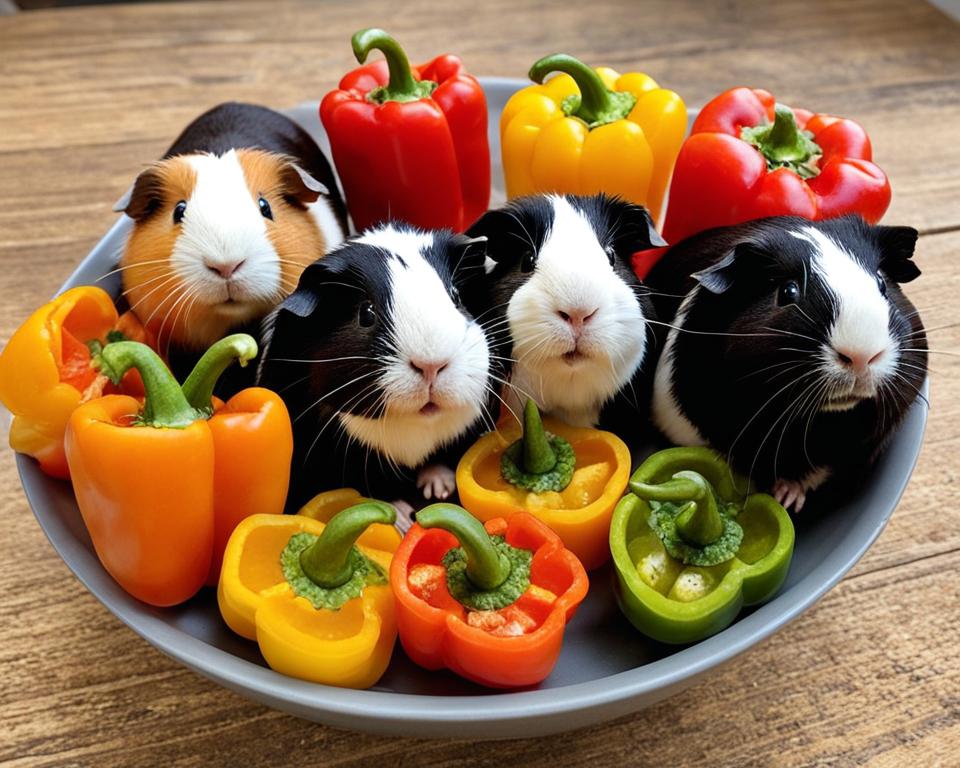
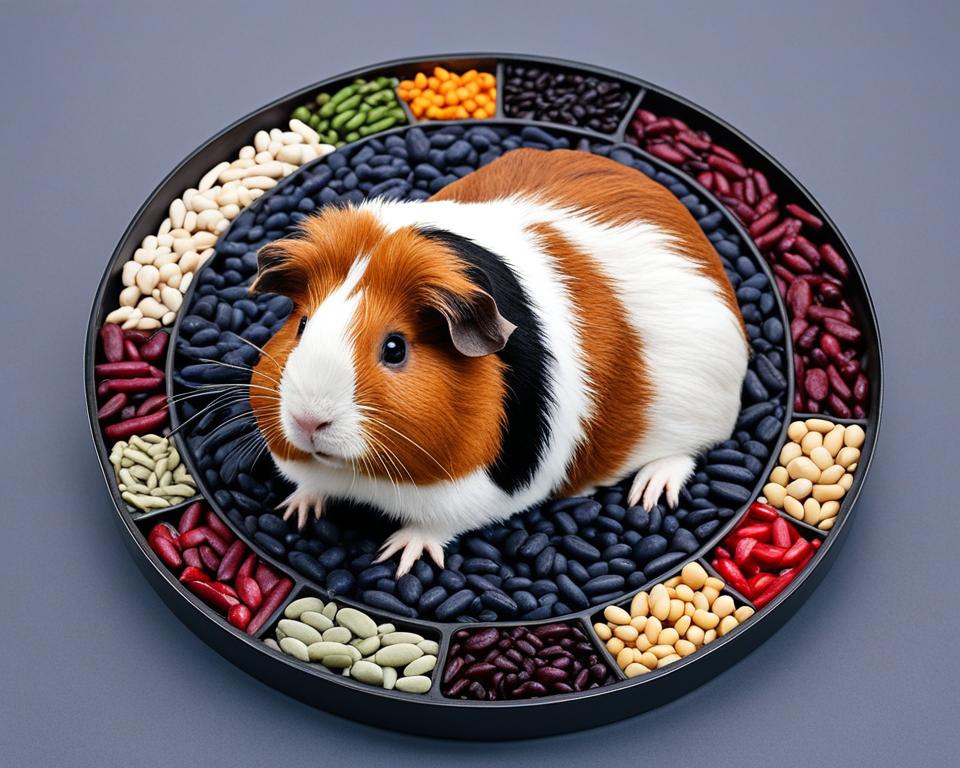
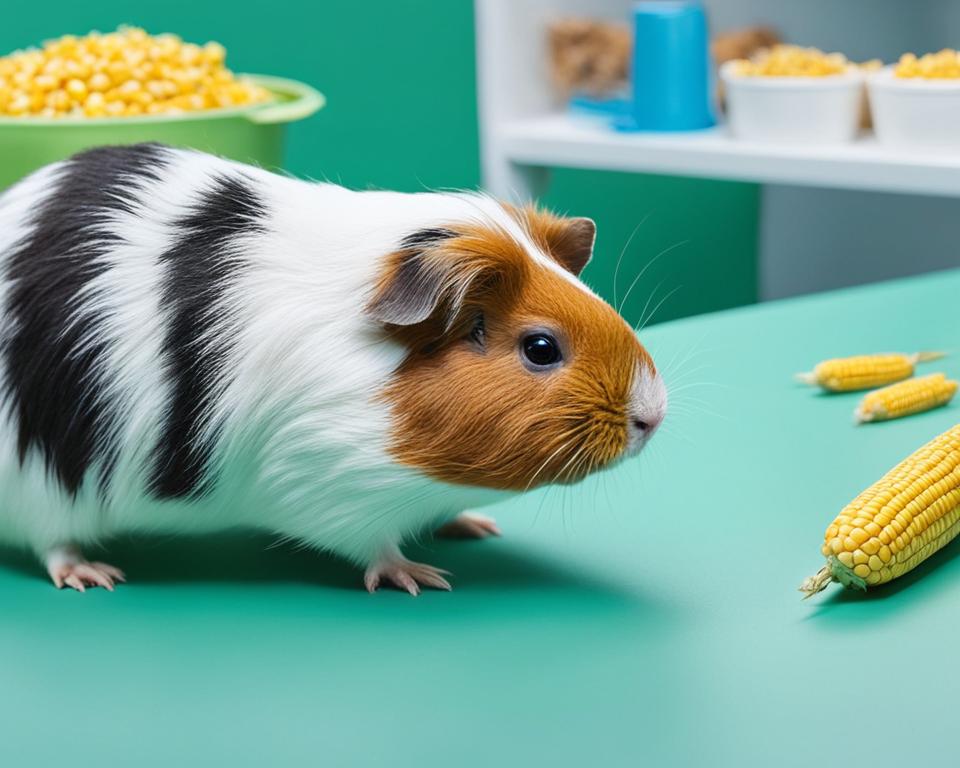
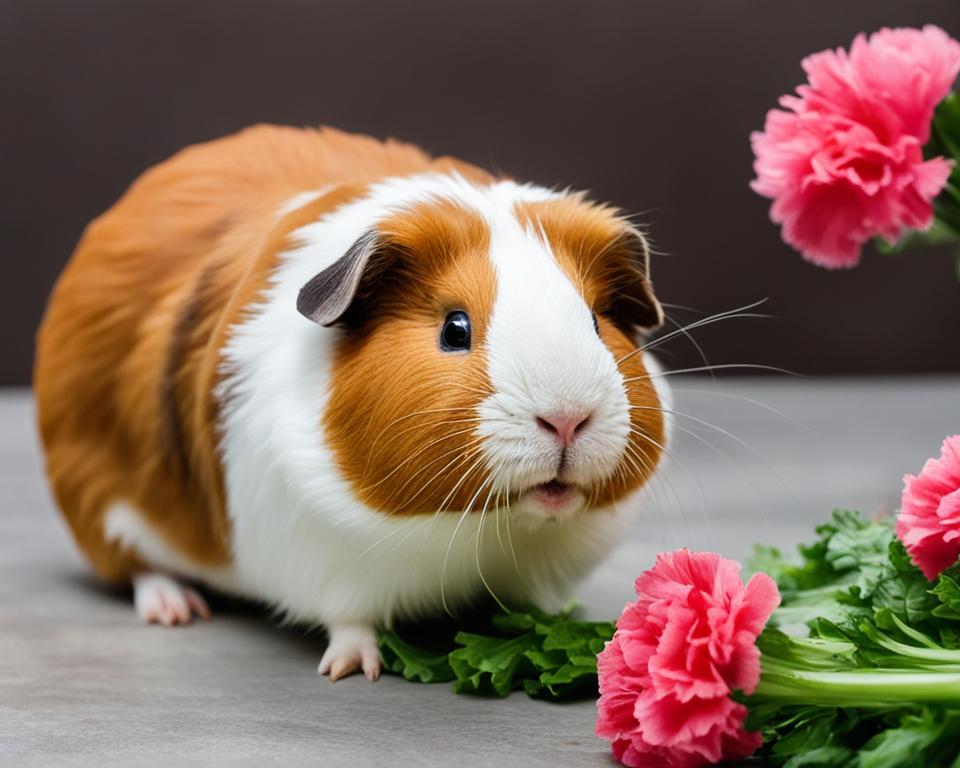
Leave a Reply